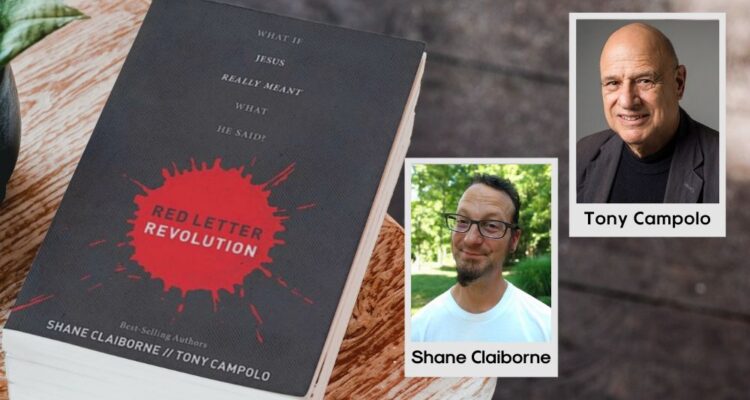Excerpt from Red Letter Revolution by Tony Campolo and Shane Claiborne. Reprinted with permission.
For nation shall rise against nation, and kingdom against kingdom … these are the beginnings of sorrows. MARK 13:8 KJV
TONY: I’m disturbed that some evangelicals in this country are so intensely committed to supporting the state of Israel that they have lost sight of the need to stand up for justice for Palestinians, even for those Palestinians who are their Christian brothers and sisters. Note that I referred to the state of Israel. It’s one thing to love the Israeli people and want to see their borders secure, their children live without fear that terrorists will bomb their school buses, and to call for an end to the rockets regularly being lobbed into Israeli territory by angry members of Hamas in the Gaza Strip. But it is quite another thing to say we are committed to the policies of the Israeli government, no matter what it does to the Palestinian people. I am frustrated when I hear evangelicals say that anyone who criticizes the policies of the Israeli government is opposed to God. Then they usually quote the Bible and say, “Whoever blesses Israel will be blessed of God, and whoever curses Israel will be cursed by God” (Genesis 27:29, paraphrased).
There is little doubt that the unquestioning pro-Israeli government mindset among Evangelical Zionists here in the United States has become a major barrier to peace in the Middle East. Any attempt to get the Israeli government to return to the Palestinians the land its army took away during times of war or stole during times of “peace” is met with the same by Evangelical Zionists, even though the Israeli government has demonstrated by returning Gaza to Palestinians that giving up land for peace is something it is willing to do.
SHANE: While I was in the Holy Land last year, a priest told us sadly that if Jesus had tried to make his walk from Bethany to Jerusalem today, he wouldn’t be able to make it through the checkpoints. We lamented together that the wall that so terribly divides this Holy Land into what one Israeli leader called “the most sophisticated apartheid system the world has ever seen.”
As I walked the footsteps of Jesus through the land, I was reminded of a story Jesus told about a wealthy man who built a wall and locked the poor outside of it, a story often known as “the Rich Man and Lazarus” (Luke 16:19–31). In the story, the rich man has created a gated neighborhood and locked the poor beggar, named Lazarus, outside the gate. He’s living it up inside the wall while the poor man suffers on the other side. As the story goes, when they die, Lazarus is rescued by the angels who carry him to Abraham’s side in paradise. The rich man ends up in the flames of hell, pleading with the beg- gar for a drop of water. But Abraham tells him that he received his good things on this earth while Lazarus suffered, but now Lazarus is comforted while the rich man is in agony. It’s a heavy story and one that says a lot about class struggle.
The only character in any of Jesus’ parables to be given a name is this beggar. And his name is Lazarus, which means “the one God rescued.” The rich man, however, is not named. No doubt the fellow had a name on earth; he probably had a street or a corporation named after him! While we don’t know his name, we do know that the rich man was religious. He knows the prophets and refers to Abraham as “father,” and yet his religion did nothing to tear down the wall he had built between himself and his poor neighbor.
The rich man comes to see that his gated neighborhood not only separated him from the beggar Lazarus but it separated him from God. To love God is also to love the most vulnerable of God’s children. We are made for compassion.
So often we build walls to protect ourselves only to find that we are the ones held hostage. We think we are locking others out, but we are really locking ourselves in. Not only are the poor robbed of community and compassion, but so are the rich. If only the rich man had opened his gates, not only would Lazarus have been set free but so would he.
I heard a rabbi say that the parables are like diamonds. As we look at them in different light, they take on new dimensions. When I was in the Middle East, I saw the story with new eyes. One of the most important things I learned in the Holy Land is that both Israelis and Palestinians are being held hostage; they are both locked behind walls. I heard folks on both sides say they didn’t care if the solution was one state or two states or no state, as long as all people were treated equally and with dignity.
The great thing is that walls are never too big to fall. One of Jesus’ promises in the Gospels is that the gates of hell will not prevail. There are hells today that hold people hostage, and we should be storming the gates to rescue them. As we do it, we will discover that when the walls fall down, both Lazarus and the rich man are better off. As Red Letter Christians, we need work to tear down all walls and eliminate this hell on earth.
To be continued tomorrow…

